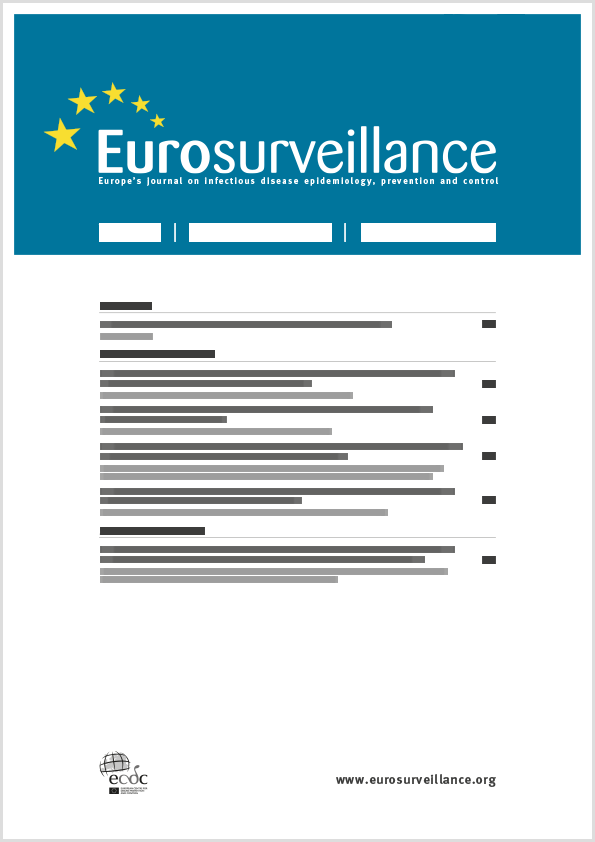- Home
- Eurosurveillance
- Previous Issues
- Volume 16, Issue 16, 21/Apr/2011
Eurosurveillance - Volume 16, Issue 16, 21 April 2011
Volume 16, Issue 16, 2011
- Rapid communications
-
-
-
Measles resurgence in Belgium from January to mid-April 2011: a preliminary report
More LessFrom 1 January to 14 April 2011, a total of 155 measles cases were notified in Belgium, whereas throughout 2010, there were only 40. Of the 103 cases with known vaccination status, 87% had not been vaccinated with measles-mumps-rubella vaccine. The resurgence of measles is the consequence of insufficient vaccine coverage in previous years. Efforts to communicate the benefits of measles vaccination to the public and to advise health professionals on control measures and outbreak management are ongoing.
-
-
-
Imported extensively drug-resistant Mycobacterium tuberculosis Beijing genotype, Marseilles, France, 2011
S Cohen-Bacrie , I Ben Kahla , E Botelho-Nevers , M Million , P Parola , P Brouqui and M DrancourtMore LessMultidrug- (MDR) and extensively drug-resistant (XDR) tuberculosis (TB) are reported to gradually spread across European countries with low TB prevalence including France. Some isolates may even accumulate traits of resistance in addition to the XDR profile, as a result of therapeutic mismanagement. We report here the first case of XDR TB in Marseilles and discuss the potential effectiveness of sulfamide treatment in such cases.
-
- Top
-
- Research articles
-
-
-
Contamination of the cold water distribution system of health care facilities by Legionella pneumophila: Do we know the true dimension?
M Arvand , K Jungkind and A HackMore LessGerman water guidelines do not recommend routine assessment of cold water for Legionella in healthcare facilities, except if the water temperature at distal sites exceeds 25 °C. This study evaluates Legionella contamination in cold and warm water supplies of healthcare facilities in Hesse, Germany, and analyses the relationship between cold water temperature and Legionella contamination. Samples were collected from four facilities, with cases of healthcare-associated Legionnaires´ disease or notable contamination of their water supply. Fifty-nine samples were from central lines and 625 from distal sites, comprising 316 cold and 309 warm water samples. Legionella was isolated from central lines in two facilities and from distal sites in four facilities. 17% of all central and 32% of all distal samples were contaminated. At distal sites, cold water samples were more frequently contaminated with Legionella (40% vs 23%, p <0.001) and with higher concentrations of Legionella (≥1,000 colony-forming unit/100 ml) (16% vs 6%, p<0.001) than warm water samples. There was no clear correlation between the cold water temperature at sampling time and the contamination rate. 35% of cold water samples under 20 °C at collection were contaminated. Our data highlight the importance of assessing the cold water supply of healthcare facilities for Legionella in the context of an intensified analysis. .
-
- Top
-
- Perspectives
-
-
-
European Risk Assessment Guidance for Infectious Diseases transmitted on Aircraft – the RAGIDA project
More LessIn order to assist national public health authorities in the European Union to assess the risks associated with the transmission of infectious agents on board aircrafts, the European Centre for Disease Prevention and Control initiated in 2007 the RAGIDA project (Risk Assessment Guidance for Infectious Diseases transmitted on Aircraft). RAGIDA consists of two parts: the production of a systematic review and a series of disease-specific guidance documents. The systematic review covered over 3,700 peer-reviewed articles and grey literature for the following diseases: tuberculosis, influenza, severe acute respiratory syndrome (SARS), invasive meningococcal disease, measles, rubella, diphtheria, Ebola and Marburg haemorrhagic fevers, Lassa fever, smallpox and anthrax. In addition, general guidelines on risk assessment and management from international aviation boards and national and international public health agencies were systematically searched. Experts were interviewed on case-based events by standardised questionnaires. Disease-specific guidance documents on tuberculosis, SARS, meningococcal infections, measles, rubella, Ebola and Marburg haemorrhagic fevers, Lassa fever, smallpox and anthrax were the result of consultations of disease-specific expert panels. Factors that influence the risk assessment of infectious disease transmission on board aircrafts and decision making for contact tracing are outlined.
-
- Top
-
- News
-
Volumes & issues
-
Volume 30 (2025)
-
Volume 29 (2024)
-
Volume 28 (2023)
-
Volume 27 (2022)
-
Volume 26 (2021)
-
Volume 25 (2020)
-
Volume 24 (2019)
-
Volume 23 (2018)
-
Volume 22 (2017)
-
Volume 21 (2016)
-
Volume 20 (2015)
-
Volume 19 (2014)
-
Volume 18 (2013)
-
Volume 17 (2012)
-
Volume 16 (2011)
-
Volume 15 (2010)
-
Volume 14 (2009)
-
Volume 13 (2008)
-
Volume 12 (2007)
-
Volume 11 (2006)
-
Volume 10 (2005)
-
Volume 9 (2004)
-
Volume 8 (2003)
-
Volume 7 (2002)
-
Volume 6 (2001)
-
Volume 5 (2000)
-
Volume 4 (1999)
-
Volume 3 (1998)
-
Volume 2 (1997)
-
Volume 1 (1996)
-
Volume 0 (1995)
Most Read This Month

-
-
Detection of 2019 novel coronavirus (2019-nCoV) by real-time RT-PCR
Victor M Corman , Olfert Landt , Marco Kaiser , Richard Molenkamp , Adam Meijer , Daniel KW Chu , Tobias Bleicker , Sebastian Brünink , Julia Schneider , Marie Luisa Schmidt , Daphne GJC Mulders , Bart L Haagmans , Bas van der Veer , Sharon van den Brink , Lisa Wijsman , Gabriel Goderski , Jean-Louis Romette , Joanna Ellis , Maria Zambon , Malik Peiris , Herman Goossens , Chantal Reusken , Marion PG Koopmans and Christian Drosten
-
- More Less


